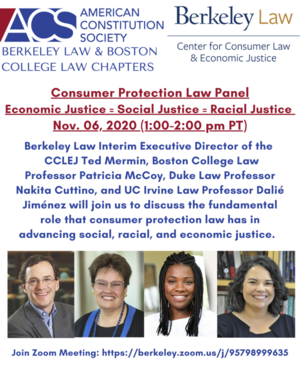It has been a year of upheaval and insecurity, of racial injustice and financial crisis. We have believed from the Center’s founding that economic injustice underlies many of the most urgent problems faced by this nation. And we have worked steadily ever since to address those problems, in partnership with students and faculty, with allied organizations, and with the Center’s broad and growing community of supporters.
We are proud to tell you what we have been up to, and grateful that you have been there with us every step of the way.
Read on.
Shielding California Consumers from Financial Predation
This fall the Center is celebrating the birth of a revamped and refocused consumer protection agency in California. The newly renamed Department of Financial Protection and Innovation (DFPI) will not only continue to supervise California’s financial institutions, but will do so with an explicit consumer protection charge.
Based on a proposal put forward three years ago by the Center’s own Ted Mermin, Berkeley Law lecturer and Consumer Reports Senior Policy Counsel Suzanne Martindale ’10, and California Policy Lab Executive Director Evan White ’12, the agency will have
new authority and new resources to protect Californians from predatory providers of financial products and services; to provide guardrails and guidance to financial technology innovators; and to conduct outreach and education to particularly vulnerable groups including veterans, students, seniors, and immigrants.

In other consumer protection policy news, two other laws developed by the East Bay Community Law Center (EBCLC) Consumer Justice Clinic with support from the Center hit the news this fall. Last year’s Senate Bill 616 went into effect on September 1, 2020. The new law sets aside a quantum of money in anybody’s bank account when a creditor levies the account and tries to clean it out. Sponsored by the Center’s colleagues at the California Low-Income Consumer Coalition, the Western Center on Law & Poverty, and EBCLC, the law requires debt collectors to leave at least $1,788 (an inflation-indexed monthly “minimum basic standard of adequate care”) in a debtor’s account. SB 616 will provide a measure of much-needed security during the current financial crisis, and has been particularly celebrated by legal service providers throughout the state after three years of a hotly contested legislative battle — as noted in a
recent ProPublica article.
Finally, in September the Governor signed Assembly Bill 2463, which will prevent the recent, pernicious practice of debt buyers using foreclosure as a tool to collect on dubious credit card debt. The new law, concocted at EBCLC with the assistance of the Center and Professor Prasad Krishnamurthy, prohibits foreclosures for consumer debts — like credit card debts, student loan debts, and medical debts — that weren’t secured by the home when they were incurred. In the middle of an economic upheaval, a pandemic, and a housing crisis, the law will help keep people in their homes at a time when that is most urgently needed.
Supervising C3PO
The Consumer Protection Public Policy Order (C3PO) is a brand-new student-initiated legal services project (SLP) that brings economic-justice-minded students together to work on important consumer protection policy initiatives. This group of 12 students is already at work developing — among other things — a comment to the CFPB on the Equal Credit Opportunity Act, a white paper on debt settlement companies, and a survey and research memo responding to the birth of California’s “mini-CFPB,” the new Department of Financial Protection and Innovation. The Center’s Executive Director Ted Mermin and staff attorney Eliza Duggan are supervising the projects, along with Miguel Soto, Sharon Djemal, and Kara Acevedo from EBCLC — and special guest stars Diane Thompson and Kate Munoz of the Consumer Rights Regulatory Engagement and Advocacy Project.
Student Sleuths
Soon after the pandemic hit, health-related scams started to spread — and the Center and the remarkable students of CAPS sprang into action. As noted in
this Berkeley Law piece, CAPSules began hunting down the scams and reporting them to state and federal agencies. The project uncovered more than 80 scams and fraudulent schemes — including price gouging, phony coronavirus cures, and efforts to illegally seize economic impact payments. The FTC and the California Attorney General’s Office, among others, sent cease and desist letters and otherwise acted in response to the referrals by Berkeley Law students.
The Scamhunters Project was also profiled in the
latest issue of Berkeley Law’s Transcript Magazine.
Published Justice
The Center has been busy working to guide the development of consumer law in California through its Published Justice project. Most of the opinions that come from the California Courts of Appeal are “unpublished,” meaning that they do not have precedential effect. However, the parties or interested observers can request that the court order publication of any unpublished opinion.
Led by staff attorney and Published Justice Fellow Eliza Duggan, the Center — joined by a raft of notable nonprofit organizations — has made four successful publication requests since May. Two of the newly published decisions will help to establish the rights of homeowners in disputes with their homeowner associations.
Third Laguna Hills Mutual v. Joslin provides important guidance on the appropriate application of “anti-SLAPP” motions between homeowners and homeowner associations, helping to protect homeowners’ rights.
Coley v. Eskaton holds that homeowner association directors can be held personally liable for their misconduct and self-dealing in managing an association.
A third case,
Graylee v. Castro, establishes that when a landlord and tenant agree that the tenant will move out to resolve an unlawful detainer, courts still have to look at the terms to make sure they are reasonable before they can enforce any liquidated damages provision in the event of a breach. Finally,
Mejia v. DACM held that the arbitration clause in a consumer credit contract was unenforceable because it did not allow the consumer to pursue public injunctions, an unwaivable right.
The Supremes Follow a Friendly Suggestion in Seila Law v. CFPB
 Last term, in Seila Law v. CFPB, the U.S. Supreme Court heard a challenge to the structure of the federal Consumer Financial Protection Bureau. The Center joined other consumer law Centers and Clinics in an amicus brief that argued that the challenged provision of the Dodd-Frank Act was severable, so the CFPB as a whole should survive even if the Court were to hold unconstitutional the Bureau’s single-director-removable-only-for-cause. And, notably, that is just what the Court did.
Last term, in Seila Law v. CFPB, the U.S. Supreme Court heard a challenge to the structure of the federal Consumer Financial Protection Bureau. The Center joined other consumer law Centers and Clinics in an amicus brief that argued that the challenged provision of the Dodd-Frank Act was severable, so the CFPB as a whole should survive even if the Court were to hold unconstitutional the Bureau’s single-director-removable-only-for-cause. And, notably, that is just what the Court did.
COVID-19 Consumer Protection Guides
In the wake of the pandemic, a slew of consumer issues arose. In the face of a constant stream of news that seemed to change hourly, people had a lot of questions. What happens if I can’t pay rent? Can I get my money back for my flight? What rights do I have regarding my student loans? The Center decided to respond to these questions — and more — with a series of Consumer Guides on COVID-19. Check them out here.




“Economic Justice is Racial Justice”

This is a principle on which the Center was founded. And on November 6 at 1:00 p.m., the Center will join with the American Constitution Society to present a seminar on the topic with consumer law luminaries Dalie Jimenez of UC Irvine, Patricia McCoy of Boston College, and Nakita Cuttino of Duke. Please join us!
Event Zoom link: https://berkeley.zoom.us/j/95798999635

 Last term, in Seila Law v. CFPB, the U.S. Supreme Court heard a challenge to the structure of the federal Consumer Financial Protection Bureau. The Center joined other consumer law Centers and Clinics in an amicus brief that argued that the challenged provision of the Dodd-Frank Act was severable, so the CFPB as a whole should survive even if the Court were to hold unconstitutional the Bureau’s single-director-removable-only-for-cause. And, notably, that is just what the Court did.
Last term, in Seila Law v. CFPB, the U.S. Supreme Court heard a challenge to the structure of the federal Consumer Financial Protection Bureau. The Center joined other consumer law Centers and Clinics in an amicus brief that argued that the challenged provision of the Dodd-Frank Act was severable, so the CFPB as a whole should survive even if the Court were to hold unconstitutional the Bureau’s single-director-removable-only-for-cause. And, notably, that is just what the Court did. 




